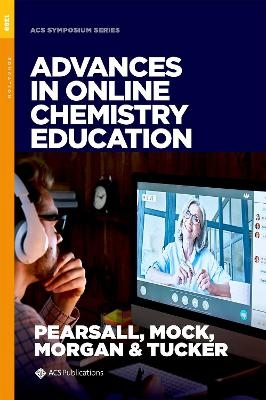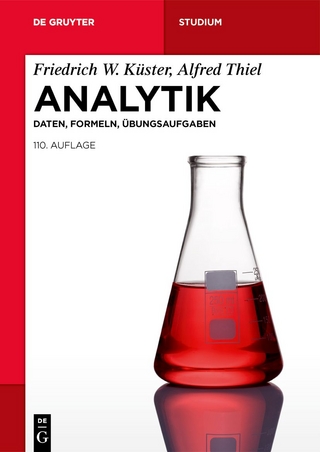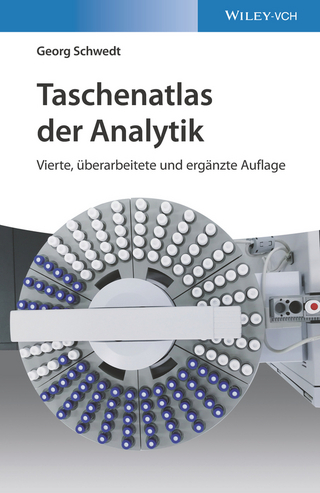
Advances in Online Chemistry Education
Oxford University Press Inc (Verlag)
978-0-8412-9823-1 (ISBN)
Reimagining content for online delivery
Transitioning to online learning, educators have been tasked with the difficult work of finding ways to reimagine content and deliver engaging courses that best serve each student's learning journey. This work offers data-supported strategies for online chemistry education with perspectives from students, teaching associates, teaching fellows, and academics. Chapters include case studies around teaching chemistry online, a review of options for chemistry labs in an online course, and guidance
for adapting on-ground chemistry courses for the virtual environment in both asynchronous and synchronous delivery modalities. This work is a valuable resource for chemistry instructors seeking to build authentic student engagement.
Elizabeth Pearsall (Ph.D.,University ofNorthCarolina at Greensboro) is currently the Associate Dean for the Institute for Teaching Excellence at York Technical College, a two-year technical college in Rock Hill, South Carolina, whose mission is to build the community through maximizing student success. Under her leadership, the Institute for Teaching Excellence provides guidance and direction for teaching innovation and excellence throughout the College, for courses in all modalities. Previously, she served as an Associate Professor and the Director of Faculty at a large doctoral granting institution overseeing chemistry, biology, physics, and earth science faculty. In this role, she was afforded an opportunity to train, coach, and evaluate faculty in online teaching excellence principles across multiple science disciplines. With more than 10 years of chemistry teaching experience, she has instructed in multiple modalities including on-ground, hybrid, and online chemistry and biology courses. Rooted in teaching practices developed while instructing chemistry and biology courses, and honed over the years through a combination of experimentation in the classroom, teaching across science disciplines, and additional professional development, her philosophy is that instruction must be relevant, equitable, and focused on student success regardless of discipline or modality. Kristi Mock (Ph.D., University of Toledo) is a chemistry lecturer at the University of Toledo. She started teaching in 2005 during graduate school, and did not expect to fall in love with the art of teaching chemistry. After nine years teaching in a traditional, on-ground chemistry classroom, she entered the world of online teaching. Since 2014, she has been involved in finding engaging, fun, and interactive methods of promoting student learning in the online chemistry classroom. Matt Morgan (Ph.D., Montana State University) currently instructs chemistry courses in fully online environments at Western Governors University and Embry Riddle Aeronautical University. Prior to teaching fully online, he instructed hybrid chemistry courses starting in 2011 where he developed a keen sense of the skills needed to successfully instruct chemistry students from afar. After graduating from the Air Force Academy, he went on to serve his country for 22 years in the Air Force. As a KC-135 aircraft commander, he flew during the Cold War and Desert Storm. Previously, he was a Professor of Chemistry at Hamline University and the United States Air Force Academy for 21 years. Brenna Tucker (Ph.D., University of Alabama at Birmingham) currently serves as the Introductory Chemistry Coordinator at the University of Alabama at Birmingham. She has developed multiple lecture, laboratory, and recitation chemistry courses for online instruction. Although she always knew she wanted to be an educator, she discovered a passion for chemistry education as a teaching assistant in graduate school. Her postdoctoral pursuits focused on developing an online chemistry curriculum and she has completed professional development in the areas of online pedagogy and teaching practices.
Preface
Chapter 1: Promoting Student Learning and Engagement: Data-Supported Strategies from an
Asynchronous Course for Nonmajors, Laura E. Simon, Marcia L. O. Kloepper, Laurel E. Genova, and Kathryn D. Kloepper
Chapter 2: Transitioning from High-Stakes to Low-Stakes Assessment for Online Courses, Matthew D. Casselman
Chapter 3: A First Semester General Chemistry Flipped Remote Classroom: Advantages and
Disadvantages, Wendy E. Schatzberg
Chapter 4: Problem Based Learning Group Projects in an Online Format - A Sequential
Approach, Simona Marincean and Marilee A. Benore
Chapter 5: Maintaining Rigor in Online Chemistry Courses - Lessons Learned, Mitzy Erdmann, Sithira Ratnayaka, Brenna A. Tucker, and Elizabeth Pearsall
Chapter 6: A How-To Guide for Making Online Pre-laboratory Lightboard Videos, Timothy R. Corkish, Max L. Davidson, Christian T. Haakansson, Ryan E. Lopez, Peter D. Watson, and Dino Spagnoli
Chapter 7: Working It Out: Adapting Group-Based Problem Solving to the Online Environment, J. L. Kiappes and Sarah F. Jenkinson
Chapter 8: Teaching Chemistry Down Under in an "Upside Down" World: Lessons Learned
and Stakeholder Perspectives, Elizabeth Yuriev, Andrew J. Clulow, and Jennifer L. Short
Chapter 9: Student Experiences and Perceptions of Emergency Remote Teaching, Barbara Chiu and Nicole Lapeyrouse
Chapter 10: Students as Partners: Co-creation of Online Learning to Deliver High Quality,
Personalized Content, Amy L. Curtin and Julia P. Sarju
Chapter 11: Options and Experiences for Online Chemistry Laboratory Instruction, Matt Morgan and Emily Faulconer
Chapter 12: Lessons Learned from Implementing Blended and Online Undergraduate Chemistry
Laboratory Teaching during the Covid-19 Pandemic, Helen Cramman, Mia A. B. Connor, Chapman Hau, and Jacquie Robson
Editors' Biographies
Author Index
Subject Index
| Erscheinungsdatum | 06.12.2021 |
|---|---|
| Reihe/Serie | ACS SYMPOSIUM SERIES |
| Verlagsort | New York |
| Sprache | englisch |
| Maße | 182 x 262 mm |
| Gewicht | 678 g |
| Themenwelt | Naturwissenschaften ► Chemie ► Analytische Chemie |
| Naturwissenschaften ► Chemie ► Organische Chemie | |
| ISBN-10 | 0-8412-9823-8 / 0841298238 |
| ISBN-13 | 978-0-8412-9823-1 / 9780841298231 |
| Zustand | Neuware |
| Haben Sie eine Frage zum Produkt? |
aus dem Bereich


